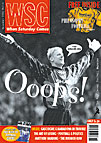 German politicians understand the importance of declaring an interest in football, though some are more sincere than others as Uli Hesse-Lichtenberger explains
German politicians understand the importance of declaring an interest in football, though some are more sincere than others as Uli Hesse-Lichtenberger explains
Sometime in early May, Helmut Kohl walked into a cabinet meeting. As usual, he was the last to enter the room. Maybe this befits his position as party captain, maybe it is a superstition left over from his days as a footballer. ( He is said to have been a not entirely untalented midfielder when he was younger. And, presumably, slimmer). He looked like a man who had just heard the greatest joke of all time and yearns to share it with someone. He stopped dead in his tracks just as he was about to pass Seiters.
Minister Seiters is a decidedly unhappy-looking man, the kind you presume to be the butt of practical jokes in this cabinet. He also carries the misfortune to value regional pride, and therefore supports SV Meppen, the epitome of second division football. Right now he was trying to concentrate on some awfully important memo.
Kohl’s piggy eyes gleamed with mischief. He slammed his briefcase with such force into the back of an unsuspecting Seiters that sudden panic overcame the latter. Seiters turned around, wondering if he had committed a cardinal sin and was about to be reprimanded.
“Well?” bellowed Kohl, “Next season? Meppen against Kaiserslauten?” He laughed substantially. Seiters managed a dry smile.
Kaiserslauten, founder members of the Bundesliga, had just lost another vital game in their fight against relegation.The number on Helmut Kohl’s club membership card reads 001. Now, most football people who take their football club seriously will not go to work with a smile on their face when their team is about to be relegated. Which pretty much sums it up; from a politician’s point of view, club football is not a matter of life and death.
Some German politicians hold important posts at clubs. The Liberal Democrat Jürgen Molleman, a man who knows little about politics but should carry a degree in PR, sits on the board at Schalke 04 and cannot let the club live in peace; once he parachuted over their ground and landed in the centre circle. But in the greater scheme of things he is just another face in Schalke’s collection of curios – the Pope and a porn-queen are club members, too.
The footie-face carrying the largest political profile is probably VFB Stuttgart’s president Gerhard Meyer-Vorfelder, who at times leans so far towards the right that he is about to keel over. Known as GMV, the Christian Democrat is also an important force within the German FA. When the Bosman ruling became known he led the pack of those club executives who feared the coming of the apocalypse, ie teams packed with foreigners.
Still, hardcore politics and club football do not mix well, probably because clubs are not privately owned, making Berlusconi-style scenarios unlikely. Many local politicians have affiliations with a club, but that is to be expected, since they tend to get everywhere. The most telling example is probably the Federal Minister for Employment, Norbert Blum. As long as Borussia Dortmund languished in the netherworld, he slept in his black and yellow scarf. Since they have joined the nouveau-riche, though, he prefers to stay in the background. To be seen at cocktail parties is bad PR for a man who is supposed to be working for the lower classes . . .
And yet politics did creep into German football from two directions. First, there was the legacy of the GDR – clubs like Dynamo Berlin had ties with the secret police so strong that referees were no longer needed when they played. The so called Stasi even forced players to spy on their colleagues and coaches; and blowing the cover of these informers (who carried code-names and everything!) naturally created bad blood and big headlines. But today the hotbed for political activity is the fanzine. While there are of course a few right-wing fanzines, most have been started by people who have ties to the punk/alternative scene and tend to carry the religious fervour of that lifestyle into football. Still, one of the most wonderful sights in German football is watching the crowd at St Pauli, where countless radical left squatters dressed in black cheer a team playing in brown shirts.
I almost forgot the national team. After they won Euro 96, Helmut Kohl crashed the party, elbowed Vogts out of view and took centre stage. This team, which had bravely battled on despite so many injuries, Kohl told the nation, should inspire the whole country, especially those lazy workers who take a week off because they only have a cold.
The next thing he said was probably “Ask not what your country can do for you . . .” but I did not hear it, because like so many others I fainted right there and then.
From WSC 118 December 1996. What was happening this month